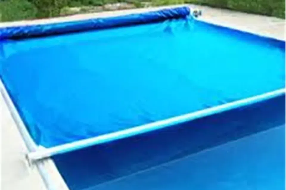Hot Keywords:
- All
- Product Name
- Product Keyword
- Product Model
- Product Summary
- Product Description
- Multi Field Search

Outdoor swimming pools are usually not in use when winter or the rainy season comes. In this way, the maintenance of outdoor swimming pools becomes indispensable. If the swimming pool is not managed and maintained, it will be unable to be used when needed due to various problems. When it comes to the maintenance of swimming pools, the most important thing is to reduce water evaporation and maintain water temperature. In winter, it is necessary to prevent fallen leaves and debris from polluting the water body. In summer, it is necessary to prevent direct sunlight and algae growth in the swimming pool. Pool cover - an economical and practical protective facility, made of PVC-coated fabric. PVC coated fabric is an excellent material for swimming pool covers and is the first choice for purchasers.
Ordinary plastic swimming pool covers tend to become brittle and crack under direct sunlight, while the UV resistance of PVC-coated fabric enables them to be used outdoors for up to 8 to 10 years. Take a certain European brand as an example. After five years of actual use, the tensile strength of its PVC swimming pool cover still remains above 85%. This means that purchasers can provide customers with more durable products and reduce after-sales maintenance costs.
The airtightness of PVC material can reduce water evaporation by more than 80%, lowering the demand for water replenishment. Meanwhile, its heat insulation performance can reduce the heat loss of the swimming pool at night by 50%, directly saving heating energy consumption. This is particularly important for commercial swimming pool operators such as hotels and gyms, as it can save hundreds of dollars in energy costs every year.
Compared with traditional metal or hard plastic covers, PVC fabric is light in weight and can be easily unfolded or stored by a single person. Some products can also be customized with folding designs to adapt to irregularly shaped swimming pools. After a certain resort adopted custom PVC roller shutter pool covers, the operation time of the staff was shortened by 70%.
Modern PVC coating processes have achieved lead-free and phthalate-free formulations, meeting the requirements of regulations such as REACH and RoHS. Some manufacturers also offer recyclable material options to help purchasers respond to the sustainable development trend.
Although the initial cost of PVC fabric is slightly higher than that of ordinary plastic, its lifespan can be 3 to 5 times that of the latter. Calculated on a 10-year cycle, the comprehensive cost can be reduced by more than 40%. Studies show that after commercial swimming pools adopt PVC covers, the average payback period of investment is only 1.8 years.
PVC coated fabrics not only resist ultraviolet rays but also tear. These characteristics directly determine the applicability and lifespan of PVC swimming pool covers in complex environments. In the increasingly fierce market competition, mastering the core advantages of materials and accurately delivering value can help purchasers win the long-term trust of customers.

